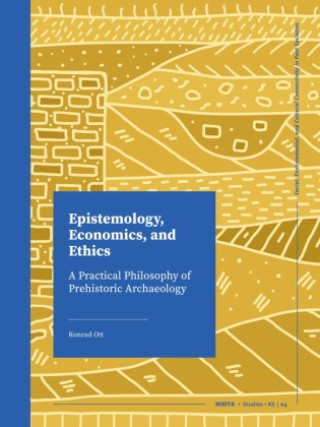
Kód: 44743985
Epistemology, Economics, and Ethics
Autor Konrad Ott
This book is intended to be a groundwork of how to theorise prehistory and archaeology and how to make connectivities between the past and the present. It is divided into four parts. The first part is epistemological. It explains ... celý popis
- Jazyk:
 Angličtina
Angličtina - Vazba: Brožovaná
- Počet stran: 256
Nakladatelství: Books on Demand, 2023
- Více informací o knize

Mohlo by se vám také líbit
-

Dune
262 Kč -

Haunting Adeline
617 Kč -

Berserk Deluxe Volume 2
1093 Kč -

White Nights
90 Kč -

Powerless
276 Kč -

Atomic Habits
339 Kč -

Dune Messiah
178 Kč -

Berserk Deluxe Volume 3
1138 Kč -

One Day
276 Kč -

Berserk Deluxe Volume 1
1112 Kč -

Iron Flame
352 Kč -

Surrounded by Idiots
256 Kč -

Harry Potter and the Prisoner of Azkaban (Minalima Edition)
688 Kč -

Gravity Falls Journal 3
440 Kč -

Heaven Official's Blessing: Tian Guan Ci Fu (Novel) Vol. 1
440 Kč -

The Creative Act
586 Kč -

Dune
213 Kč -

Hunting Adeline
625 Kč -

A Little Life
276 Kč -

Children of Dune
174 Kč -

Heaven Official's Blessing: Tian Guan Ci Fu (Novel) Vol. 2
441 Kč
Darujte tuto knihu ještě dnes
- Objednejte knihu a zvolte Zaslat jako dárek.
- Obratem obdržíte darovací poukaz na knihu, který můžete ihned předat obdarovanému.
- Knihu zašleme na adresu obdarovaného, o nic se nestaráte.
Více informací o knize Epistemology, Economics, and Ethics
Nákupem získáte 101 bodů
 Anotace knihy
Anotace knihy
This book is intended to be a groundwork of how to theorise prehistory and archaeology and how to make connectivities between the past and the present. It is divided into four parts. The first part is epistemological. It explains why there must be theoretical investments if past ways of human life are to be understood and explained. This insight is specified to a ladder-model (sensu Hawkes) with conceptual scaffoldings on each step. Stepwise, sets of concepts are introduced. This constitutes a reflective turn for archaeologists by showing how theoretical investments can be justified, substantiated and rejected. The second part makes a specific investment: original historical materialism. It claims that the Neolithic transformation makes humans economic agents. Stepwise, economic agency and its categories must have come to mind to earlier humans once they started to "produce". This part harbours Marx's idea that modern economic theories help to explain archaic economic activities. The third part claims that the Anthropocene originates within the Neolithic transformation. A chorus song of Sophocles is taken as an intellectual spike of the early Anthropocene. Crucial qualitative achievements of the Neolithic transformation can be expanded in their quantities without intrinsic limitations. Under modern boundary conditions, such expansions transform into the "Great Acceleration". If so, the current trajectories of growth have deep roots. Given this ongoing transformation into the Anthropocene, a concept of responsibility becomes unavoidable. This concept grounds the fourth part that asks for ethical principles for a "good" Anthropocene in different fields of policy-making. A focus is laid on adaptation to climatic change. Some ethical building blocks for a second axial age are proposed. The book concludes with reflections upon heterarchical modes of life and upon the lifeworld of practical reasons.
 Parametry knihy
Parametry knihy
1009 Kč
- Plný název: Epistemology, Economics, and Ethics
- Autor: Konrad Ott
- Jazyk:
 Angličtina
Angličtina - Vazba: Brožovaná
- Počet stran: 256
- EAN: 9789464270815
- ID: 44743985
- Nakladatelství: Books on Demand
- Hmotnost: 937 g
- Rozměry: 280 × 210 × 17 mm
- Rok vydání: 2023
Osobní odběr Praha, Brno a 12903 dalších
Copyright ©2008-24 nejlevnejsi-knihy.cz Všechna práva vyhrazenaSoukromíCookies



 Vrácení do měsíce
Vrácení do měsíce 571 999 099 (8-15.30h)
571 999 099 (8-15.30h)